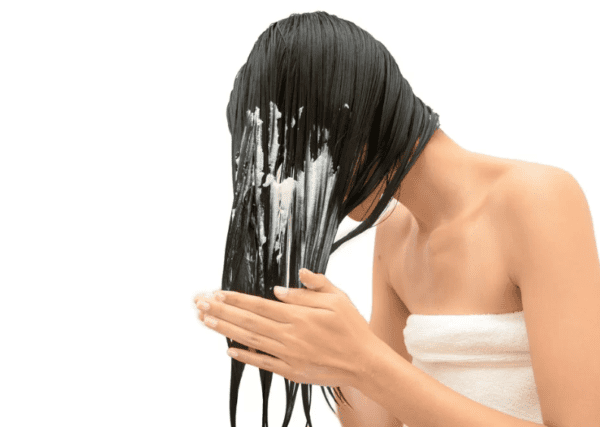This type of situation can arise from different causes, but female hair loss is a great sign that something is different in the body, and therefore it is necessary to turn on the alert and seek information about the possible causes that are making the strands fall more than usual.
And if you are going through a time when your hair is literally going down the drain, you need to be aware and find out more about the subject to avoid such a situation and even tips on how to combat and treat hair loss.

What is Female Hair Loss?
Before talking about female hair loss, it must be clear that this problem is different from baldness, which also affects women. So, first let's demystify each case:
- Female hair loss: hair loss in women is usually only during a phase, which can be linked to different causes, and during this period it is noticed that the hairs are falling out more than usual (the normal fall, refers to to an average loss of 10% of hairs per day - which can vary, on average, around 100 hairs daily). During this periodic fall, other strands are born again and despite being just a phase, it is necessary to look for a treatment to stop this variation in hair loss as soon as possible.
- Female baldness: baldness is a very different subject and can be linked to several causes, the main one being a genetic inheritance. In the case of female pattern baldness, the problem affects an average of 5% of women and begins to appear between late youth and early adulthood. To differentiate the fall for some specific cause of baldness, the tip is to observe if the strands are falling out in droves, or if you start to notice flaws in the scalp, but you don't see so much hair on the pillow or on the floor of the house. This second characteristic, where the scalp becomes increasingly thin and fewer loose strands are observed, characterizes baldness that interrupts the growth of new hair; but that with an early diagnosis can be reversed.
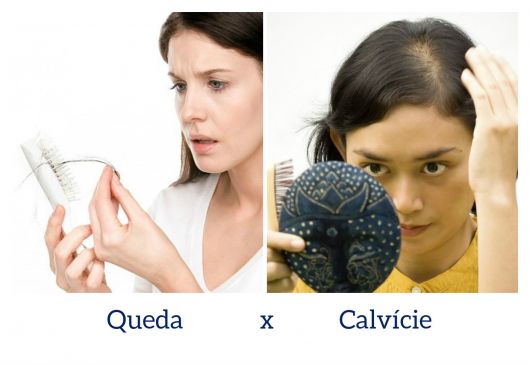
If you've already observed this difference between periodic hair loss and baldness, you can better understand your body's signals, and thus understand why your hair is falling out.
So, before you think you're going bald, it's time to observe yourself and pay a little more attention to yourself and your body.
What are the Possible Causes?
There has never been a single formula for diagnosing female hair loss, and this type of hair loss can be related to very varied problems and periods. And to exemplify these phases in which the strands fall out more intensively, let’s look at some very common causes:
hormone problem
Hormonal variation can indeed occur, but when there is an excess of one substance and/or a drastic fall of another in the body, this will reflect in some way, and one of the ways is from the weakening of the hair and hair loss.
This variation in hormones can be correlated to several situations, and one of them is the use of female contraceptives. Generally, oral and injectable contraceptives are the biggest causes of this type of hair loss, as they insert more hormones into the body. Therefore, it is extremely important to go to a gynecologist before using a contraceptive method, as this way, the doctor will order tests and from then on guide which medicine is appropriate according to your hormonal levels.
Excessive production of testosterone by the body is also a cause of female hair loss. The hormone exists and is essential to the woman's body, but its excess can generate greater oiliness in the skin and scalp and also cause hair loss.
Within the scope of diseases that can cause hair loss, there are endocrinological problems, such as thyroid dysfunction, which may be linked to an excessive release of hormones (hyperthyroidism) or by release in insufficient quantity (hypothyroidism). Gland regulation can be done through the diagnosis of this dysfunction and subsequently treated to reverse hair loss and other problems that may be related to the disease.
During Breastfeeding/Pregnancy
For those who are going through pregnancy, and especially the postpartum phase followed by feeding, you will notice a drastic hair loss, and you are not the only woman who will suffer from this.
During the pregnancy itself, it is likely that you will notice fewer loose strands and that female hair loss will cease, as the strands are strengthened due to the production of hormones for the baby's generation.

However, after the baby is born, things start to change, and excessive hair loss starts to scare. This is because the production of hormones may still be returning to normal and what did not fall during pregnancy starts to fall at this stage.
The most intense period of postpartum female hair loss usually happens, on average, up to 7 months, and soon after you can see new hairs being born. However, if the fall does not settle after this period, it is important to see a doctor, as the falling locks may be related to other problems, such as the lack of a specific nutrient.
Anemia
And as we just talked about the absence of some specific nutrient or vitamin, anemia is also a major cause of female hair loss.
And one of the main causes of this fall is the lack of iron in the body. This lack of iron goes beyond hair loss and also affects problems such as weakened nails and drowsiness.
So, if you've been noticing that you feel more tired, with hair falling out and nails weak, it's past time to look for a doctor to assess your situation.
By Stress / Anxiety
Are you nervous, stressed and suffer from anxiety?
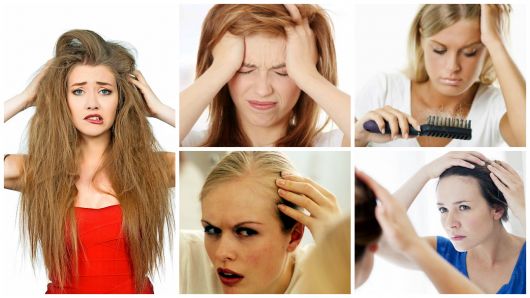
All of this is no longer a good sign for your body, and this variation in mood can reflect on your hair loss in different ways:
- Telogen effluvium: in this type of hair loss, stress or anxiety can put the follicles in a period of rest, which ceases to grow, and then you also notice that your hair is not growing as usual. After some time, the follicles that suffered from this rest begin to expel the strands, which can happen suddenly and in an amount above normal, generating female hair loss in greater quantity.
- Alopecia areata: in this type of fall, possibly caused by stress or anxiety, the immune system suffers a dysfunction and, in addition to noticing that you are getting sick more often, you also notice the hair falling out with much more intensity.
- Trichotillomania: this case is a very different variation from the previous versions that are linked to dysfunctions of the organism caused by stress. This type of hair loss is caused by the person who, without noticing it, is pulling thread by thread, and it can weaken the follicles causing the fall. Trichotillomania fall is not noticed by the person who pulls, and since he starts to adhere to this feat as a mania to deal with more stressful moments and greater anxiety. However, it can be observed by others.
So, if you've been experiencing a moment of greater stress and anxiety, hair loss may be related to one of these causes, and therefore, it's time to calm down and even seek medical attention.
Post Surgery
It is not uncommon for women to complain about post-operative hair loss, and in fact it is not the surgery itself that causes female hair loss.
There are two hypotheses for the hairs to fall after surgery – the first is related to the stress before the surgery in which the patient is anxious and worried; and the other possibility is the body's need to reestablish itself as quickly as possible, in order to direct more nutrients to recovery.
Another very common complaint of hair falling out is by patients undergoing bariatric surgery, and in this case, in addition to the two possibilities mentioned above, there is also the postoperative phase of this surgery that may be linked to a lower intake of nutrients, and in this case, even before the surgery, it is ideal to look for a professional in the nutrition area to have food monitoring.
Chemical processes
For those who love to change their locks, whether by painting, straightening or with other chemical processes that can reach the root, hair loss may be related to one of these processes, or even to the use followed by more than one chemically incompatible way.
Female hair loss caused by chemical processes can be in two ways – hair breakage or damage to the hair follicle. And both are very worrying, after all, nobody wants to go bald.
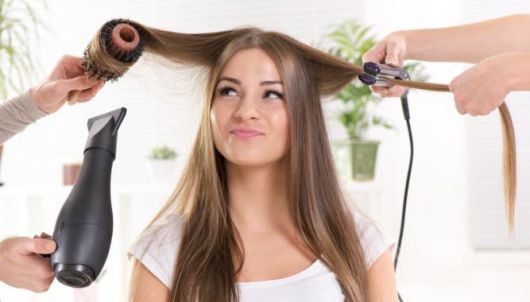
So if you're adept at any chemical process, it's best to leave the task to a professional. As tempting as it may be to do the process at home, using the wrong product or even mixing two incompatible compounds can do a lot of damage.
Therefore, no need to give in to the temptation of painting, straightening or relaxing your hair at home. A good professional knows exactly what needs to be done with each hair, and will always carry out the necessary tests before carrying out each procedure.
What to do?
As long as you are not a doctor, this is not the time to self-diagnose!
Female hair loss can involve several issues and be just an external sign of some internal dysfunction that you are not noticing, so it is essential to look for a dermatologist, a doctor who will ask for specific tests and diagnose the cause of the problem.
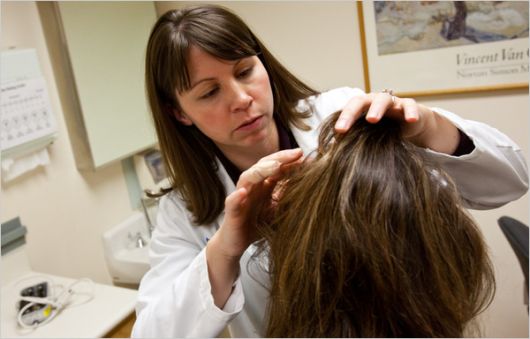
According to the exams, the doctor will point out the exact causes of the problem and, based on the diagnosis, guide the most effective treatment for hair loss, or even refer you to another medical specialty if you find another dysfunction, for example, a variation of the thyroid gland.
Medicines and Vitamins
For those who are looking for ways to combat female hair loss, the rule of seeing a doctor is essential, but before that you can orient yourself on some options for medicines and vitamins, and even ask some questions about the possible use of this type of supplement. .

Ah, but let's remember that the super dose of vitamins can also cause dysfunctions, so it's essential to know exactly what your body needs.
- Pantogar: vitamin complex that helps to complement possible absences or insufficiencies of the organism. And so, it acts in the treatment of hair loss and weak nails.
- Minoxidil: current as a vasodilator, expanding the diameter of the scalp veins, resulting in the growth of new strands and hair strengthening and volume.
- Innéov nutricare: compound based on omega 3 and oils. The compound acts on the hair bulb and helps microcirculation, resulting in stronger hair and new hair growth.
- Follixin: food supplement, which aims to regulate the lack of nutrients in the body and thus stop hair loss due to lack of nutrients and vitamins.
Home Treatments
Who never resorted to grandma's homemade recipe to take care of something?
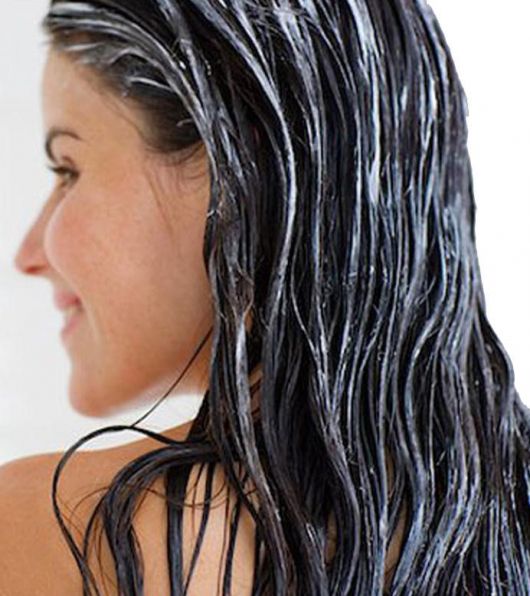
And if you are looking for how to combat female hair loss with homemade recipes, take note of the tips:
Aloe

- Remove the “drool” from two aloe vera leaves;
- Beat this aloe slime in a blender to make it easier to apply to the hair;
- Apply this mixture all over the hair, including the roots, gently massaging the scalp;
- Put on a shower cap or aluminum cap and let the mixture act for 30 minutes on the hair;
- Wash your hair normally and repeat the process twice a week.
Yogurt, olive oil and egg

- Mix a cup of natural yogurt, 3 tablespoons of olive oil and 1 egg;
- Apply this mixture all over the hair, and especially on the scalp, making circular and smooth movements at the root of the hair;
- Let the mixture in the hair act for 1 hour;
- Wash your hair normally with shampoo and conditioner;
- Repeat the procedure 1 time a week, and after 4 weeks, do the procedure only once a month.
With the tips in the post on what it can cause and how to fight it female hair loss, it's time to observe the signs your body is giving, write down everything and look for a doctor to assess your problem and thus indicate the specific treatment for your case. So, it's time to take care of yourself and take care of the highlights!





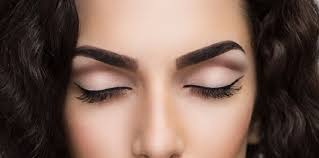




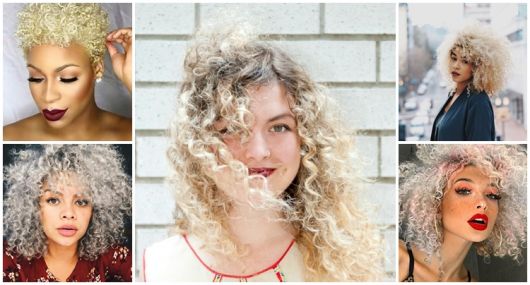
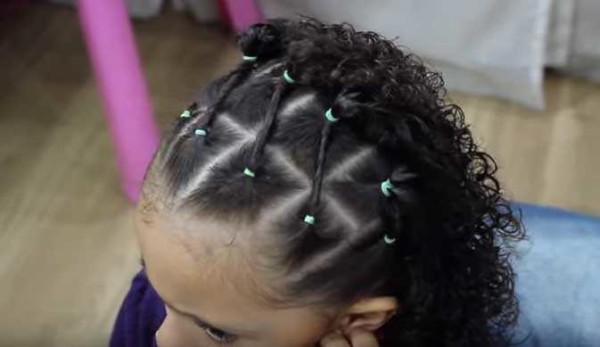






![Red Front Mecha: +50 Wonderful Ideas!【[2022]】](/images/posts/b1d51f076658647f85c4ce4fae09de90-0.jpg)




